PUBLISHER Belford, Clarke & Co., Chicago, 1875-1892
ABOUT: Alexander Belford and James Clarke. Started at corner of Congress and Wabash, opened bookstalls in department stores and expanded them to most major cities. New York branch opened in 1879 at 384-386 Broadway. Sued 1880 by Estes & Lauriat for piracy of Chatterbox [a magazine for children]. 1882 begin to publish "cheap twelvemos"; in 1885 advertised plan to manufacture two million that year, sold for as little as $.25. Sold Encyclopaedia Britannica by newspaper installment plan. Chicago building destroyed by fire in 1886. Clarke left company in 1888. Part of United States Book Co. 1890. Merged with other companies in 1892 to form Werner Company. (DLB 49). 1872-1899. Publishers in the United States (Chicago and New York branches, with occasional San Francisco and St. Louis imprints)... pioneered use of department store bookstalls... In the 1890s the remaining reprint stock was sold to the Werner Company, with one brother, Alexander, taking command of Werner's publishing division. The panic of 1898 drove Werner into receivership by 1899, and that is the last date for which any Belford imprint is seen. (Daniel G. Siegel in Stern). Firm began in Toronto; published cheap editions of American books (e.g., Twain) without copyright restrictions. "Who caused this 'cheapening' of such works? What other leading house has ever catalogued sets of standard works at $10., $12., $16. etc., and sold them at $2.40, $3.60, $4.80, etc., and even less?" (Stern). Shove also has five pages on the company. Also Obituaries for Alexander Belford
The Belford brothers emigrated from Ireland to Toronto in 1857. Charles Belford (1837-1880) was involved in the newspaper business and was editor of both The Leader and later the Toronto Mail. In 1876 he joined with his two brothers Alexander (Aleck) and Robert to form the Belford Brothers. This firm lasted two years and upon Charles' withdrawal because of ill health, the remaining brothers partnered with G. M. Rose in February, 1878 to form the publishing house of Rose-Belford.
George Maclean Rose (1829-1898) was a native of Scotland. His early training was as a printer. He was involved in the printing trade as a named partner in the Hunter Rose and Company firm. This firm carried on as a printer/publisher for a number of years.
Alexander Belford left the Rose-Belford Publishing House in 1879 and with James Clarke formed Belford, Clarke in Chicago. Robert Belford followed his brother to Chicago thereafter. In 1879 the company was styled as Belfords, Clarke & Co. The company officially incorporated in 1880 to Belford, Clarke and Company. The firm had a New York branch which was run by Robert Belford. Financial difficulties forced the company into receivership in 1889 and it officially went out of business in 1892.
(A significant number of reference materials claim that the Belford's and James Clarke left for Chicago in 1875 but this is clearly erroneous. It appears that the post-1937 references all are citing "Cheap Book Production" written by Raymond Shove - without attribution. Most likely this errant statement was copied by a number of successive "researchers". A contemporaneous article in the New York Times from 1889 notes the founding of Belford, Clarke and Co. in 1879. An article in the 1889 American Stationer quoting the same source gives an 1879 date. Other early documents note the 1879 date. The earliest known title page imprints of Belfords, Clarke and Company are in 1879.) [From the HenryAltemusCompany website].
THE BELFORD, CLARKE & CO. FAILURE. Not quite unexpectedly comes the news of the suspension of Belford, Clarke & Co.., of Chicago and New York. For time it has been supposed that this firm was bearing a heavier load than its strength could bear, but as great faith was put in the pluck and business capacity of the several members of the firm, it was hoped, at least by those most interested in its affairs, that they would pull through. But owning to a temporary embarrassment in meeting the demands made upon them by creditors who were unwilling to extend their credit, the break came. On September 23 the Sheriff took possession of their New York branch on an attachment for $25,000 granted by Judge Barrett, of the Supreme Court, in favor of Gerald F. Shepard, to whom the claim was assigned by the First National Bank of Chicago. The attachment was granted on the ground that Belford, Clarke & Co., are a foreign corporation, the headquarters being in Chicago The branch in Brooklyn was also seized by the Sheriff. On the same day, judgments were entered against them in the Circuit Court of Chicago, in favor of the First National Bank, and for $13,000 in favor of S. A. Maxwell & Co. Attachments were issued: but shortly after the Chicago store was seized by the Sheriff. Thomas C. Hammond, of the firm of Walker, Oakley & Co., leather merchants, of Chicago, was appointed receiver by Judge Shepard. Mr. Hammond, who will run the business, is at work on an inventory; until that is ready there will be no change in the present status of affairs.
The present firm of Belford, Clarke & Co., was organized after the downfall of Rose, Belford & Co, was established in Chicago March 1879, with Mr. A. Belford a President and Mr. J. Clark as Secretary and Treasurer. In January, 1880 they became involved, and settled at 40 cents on the dollar. The following May they incorporated the business as a stock company, under the laws of Illinois, with a nominal capital of $10,000. In 1881 the company became involved by the failure of John W. Lovell, of New York, but succeeded in pulling through without much loss. In February, 1882, the company reported an increase in its capital stock to $50,000. Great efforts were now made to extend the business by the establishment or retail stores, or agencies, in the largest cities of the United States, and in connection with the dry-goods houses, all of involved a large amount of capital. The New York house was established in 1883. In March 1884, the capital stock was increased to $250,000, of which it is claimed $200,000 has since been paid up. By a fire in May 1886, the firm claimed to have lost about $150,000, and a subsequent failure of a business connection in Sa Francisco cost the company $70,000 more.
Mr. Newman, attorney for the creditors, says that in his opinion the assets of the insolvent firm, consisting of stock accounts, plates, cuts, dies, copyrights, etc., would amount to about $200,000 and the liabilities to about $350,000 or $400,000. The principal creditors are the Thow Printing Company, over $150,000; Donohue & Henneberry, $75,000; the First National Bank of Chicago, $30,000; S. A. Maxwell, $13,000; and Buckley, Dunton & Co., paper dealers, for about $25,000. Prior to the appointment of the receiver. Donohue & Henneberry, who are among the largest creditors, filed a bill in which it is stated that the insolvent corporation’s capital was $500,0000, of which only $200,000 had been paid in. [Publishers’ Weekly 922 1889-09-28 p478].
[With permission of The Hyde Park Book Store, Boise, Idaho]: "Canadian Alexander Belford, an amazingly precocious child, was orphaned at ten and a book publisher at thirteen years of age. The title of his first book, issued in 1867, is disputed. It was either a reprint of Joaquin Miller's Poems or Hans Breitmann's Ballads. A year later he issued a reprint of Edward Fitzgerald's Rubaiyat of Omar Khayyam. These, it appears, were pirated, as were most of the early books from Belford. In 1873 he started "Belford's Magazine", which his brother Robert eventually managed. In 1875, he formed a partnership with James Clarke and the following year relocated Belford, Clarke Publishing from Toronto to Chicago.
Together, Belford and Clarke changed the nature of book selling---to the outrage and protests of traditionalists. For example, when a bookdealer refused to carry Belford, Clarke titles, Belford would place the books in the store next door on strict consignment---regardless of the type of store. He opened books stalls in department stores, hardware stores, shoe shops...an idea many decades ahead of its time. In towns too small to support a regular bookstore, he opened temporary stores to clear out backlogs of unsold items at cut-rate prices. This practice became known as "hippodroming."
"The company had several major publishing achievements: Belford published Peck's Bad Boy, purchased for $1,000 after it ran as a serial in a local newspaper. Aware that under-funded schools and libraries could not afford the Encyclopedia Britannica, he issued an Americanized version at a fraction of the price. It was such a huge success---the first major encyclopedia to become a fixture in households---Encyclopedia Britannica contracted with Belford to publish future editions of the inexpensive work in England. Belford marketed it aggressively---shocking the sensibilities of the British---with payment plans, subscriptions services, and glaring newspaper ads. This enterprise led to the founding of the WESTERN BOOK AND STATIONERY COMPANY to handle the accounts and distribution of the encyclopedia one volume at a time. This spawned off the TIMES BOOK CLUB.
"New partners joined, if only to help count the huge profits that were rolling in. Clarke's brother George came on board. Then Horace "Hell Every Hour" Hooper joined. The 11th edition of the encyclopedia was directed by Hooper who was also a super salesman; for example, he sold the encyclopedia to Cambridge University by promising to place the university's coat of arms on the title page of every volume, thereby giving generations of readers the false impression Cambridge had something to do with the publishing of the work. Another partner was Walter Jackson, a book dealer from Boston. Jackson and Hooper attempted to pirate the 11th edition back to America, but the new copyright laws prevented that, so they re-issued it with new plates in a special American Edition.
"Jackson then purchased the rights to Harmsworth Children's Cyclopaedia, which he re-issued in America as The Child's Book of Knowledge, the most successful subscription book in history. Clarke next purchased the rights to the Century Dictionary (see 1870---Century) which he re-issued as the Century Dictionary and Cyclopedia, added a two volume atlas, and sold it all as a 12-volume set. Clarke used the technique of advertising that at a certain date the price would be increased, then promoting it ruthlessly: THREE DAYS BEFORE PRICE INCREASED!!! TWO DAYS BEFORE PRICE INCREASES!!!, etc. And he always raised the price, at which time he would announce the second price increase and start the campaign all over again.
"Everyone connected with Belford, Clarke was getting rich and richer, but the end was in sight. First, a major fire wiped out inventory and forced Belford to default on deliveries of books. This plus the panic of 1893 forced subscribers to default on payments. Despite heavy cash flow, the bad debts began to increase until banks stepped in to protect their investments. Belford could have fought, perhaps, but he was getting old and tired. He and his partners decided to call it quits and to divide the assets. Clarke established a firm to handle the Century Dictionary, Jackson took ownership of the Book of Knowledge, and so forth. Belford merged his share (worth over three and a half million dollars) with R.S. Peale and Company to form WERNER COMPANY, which he managed. Werner company would eventually become SAALFIELD (see 1891). In 1900 Belford retired to California where he died in 1906."
“Mr. Hart was formerly manager for Belford, Clrake & Co. and succeeded to a branch of their business in May 1887. He also conducted book departments in dry-goods stores in Newark, Baltimore, Washington, Richmond, and other cities." Publishers' Weekly, 1898-09-23.
Historian Bessie Louise Pierce writes in volume III of her A History of Chicago: The Rise of a Modern City 1871-1893, (Knopf 1957), pages 168, "Particularly well known was Belford, Clarke & Co., who reprinted extensively many standard works which they unconventionally allowed to be marketed at less than list prices, not through regular booksellers, but at bookstalls and department stores. They poured out editions of Ruskin, Bulwer-Lytton, George Eliot, Thackeray, and Scott, and, in 1885 alone, 75,000 of their fifteen-volume set of Charles Dickens. In addition to their publications, this venturesome house had on its lists Dante's Inferno and Purgatory and Paradise, and volumes devoted to history, such as Guizot's A History of France from the Earliest Times to 1848, profusely illustrated, as well as other serious books of prose ad poetry. They carried on a coast-to-coast business, locating agencies in New York and San Francisco, thus emulating the example of eastern publishers with an eye to a good market in Chicago. In addition, they included among their ventures juvenile publications and the monthly Belford's Magazine, a journal to popularize serious subjects. It was first issued in June 18888, but was discontinued in July 1893, after failing to capture public favor."
Her footnote 68 reads, "Belford, Clarke & Co. was established in 1879 having been preceded by Rose-Belford Publishing Co. The firm later appears as Belford-Clarke Company. Alexander Belford and James Clarke had come to Chicago from Canada in 1875. Their price-cutting activities involved them in a series of difficulties and in 1889 they went into receivereship, reorganizaing shortly thereafter. The Chicago branch was known as the Belford-Clarke Company. It went out of business in 1892. The Publisher's Weekly, XXXVI (Sept. 28, 1889), 478, (Oct. 12, 1889), 537, 539-40, (Dec. 14, 1889), 930-31; The American Bookseller, XVI (March 16, 1885), 168, XXI (May 2, 1887), 272, XXII (Chrishtmas, 1887), 452-53, XXVI (Oct. 15, 1889), 494: Shove, op. cit., pp. 82-87; Herman E.Fleming, Magazines of a Market Metropolis (Chicago, 1906), pp. 530-31."
The Lakeside Chicago directories have not been systematically checked, but the 1890-1892 entries locate the company at 109-111 Wabash and notes Alexander Belford as president (home 832 North Park Avenue) and George B. Hammond as treasurer. There are no entries for 1894 and 1896. In 1897 and 1898, Belford, Middlebrook & Co. are located first at 160 Adams and then at 279 Dearborn. In 1899 Alexander Belford is listed 279 Dearborn, home 832 North Park. In 1900 and 1901 Alexander Bedford & Co., 279 Dearborn, is listed among publishers in the classified section. There are no entries in 1902 and later.
LUCILE’s ISSUED BY Belford, Clarke & Co.:
Red Line Edition.
1885 PTLA: Red line edition of the poets. Without doubt the finest and most complete edition of the poets ever issued in this country at a low price. 66 12mo volumes, illustrated, handsomely bound in cloth, black and gold, gilt edges... Prices, per volume, handsomely bound in cloth, gilt edges, $1.25. [Selected titles, including Lucile, offered] bound in alligator, in box, price $2.50.
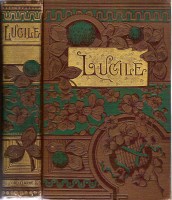
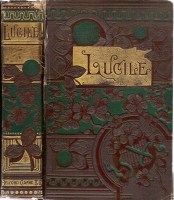
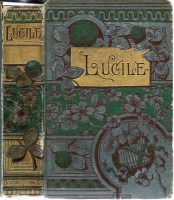
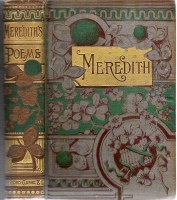
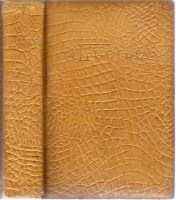
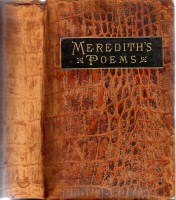
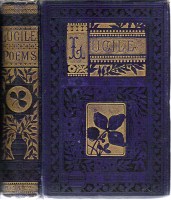
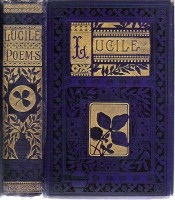
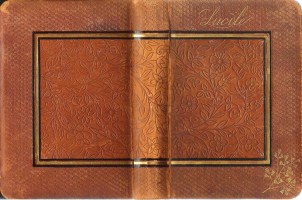
Household Edition..
1885 PTLA: Fine edition, 12mo, handsomely bound in cloth extra. Made specially for those who want a neat, plain book at a moderate price. 27 volumes, price $1.50.
1886 PTLA: as 1885. (Lucile is #259; Poetical Works #260).
1887 PTLA: as 1886. (Lucile is #225; Poetical Works #226).
1888 PTLA: as 1887. (Lucile is #341; Poetical Works #374).
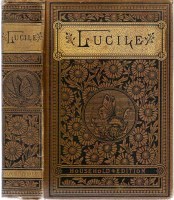
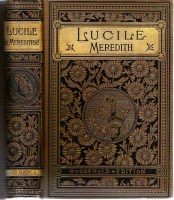
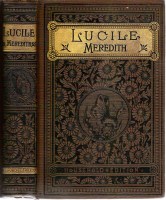
Gilt Edge Poets. 1886 PTLA: Gilt edge edition of the poets. The finest and most complete edition ever issued in this country. Fifty-nine 12mo volumes handsomely bound in cloth, black and gold, gilt edges. Price, per volume, $1.25. (Lucile is #191; Poetical Works #193).
1887 PTLA: as 1886 except "fifty-eight 12mo volumes..." (Lucile is #159; Poetical Works #161).
1888 PTLA: Illustrated. The finest and most complete edition issued in this country. Handsomely bound in Cloth, black and gold design. Full gilt edges. Each volume, price $1.25. (Lucile is #339; Poetical Works #372).
1889 PTLA: Illustrated. 12mo, Cloth, Each $1.25.
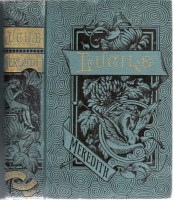
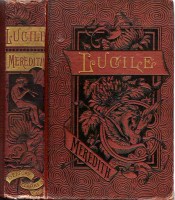
1888. Chicago, New York and San Francisco. 120x190mm, 369p. Frontispiece portrait, otherwise not illustrated. Verso of title page: Advertisement (arranged inside a circle) for Belford's Magazine. Red line pages. Brown cloth stamped black and gold; pegasus lower right, Pan on spine, "MEREDITH" in lower left (same stamping as BC4a,b); aeg. Floral endsheets. BAP BC5 copy 1 and copy 2; University of Alabama (NL 0594621). Also (details not verified): NL 0594621 University of Illinois N; Harvard; Oberlin YY.
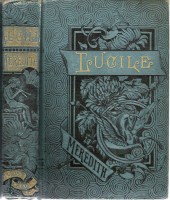
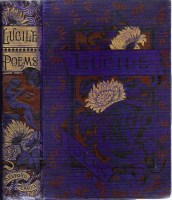
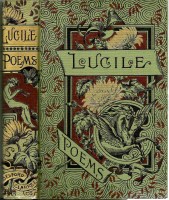
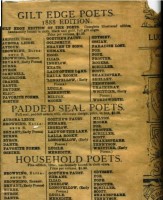
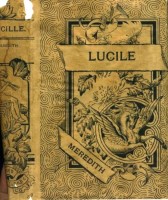
Padded Seal Poets.
1886 PTLA: Full seal, padded covers, price, in box, $2.50. (Lucile is #235; Poetical Works #236).
1887 PTLA: as 1886. (Lucile is #201; Poetical Works #202).
1888 PTLA: Padded Seal Binding with elaborate design. Each Volume in neat box. Price $2.50. (Lucile is #340; Poetical Works #373).
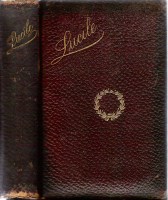
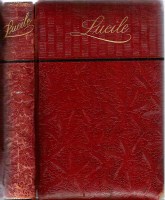
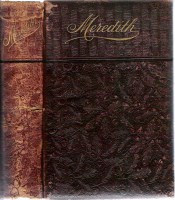
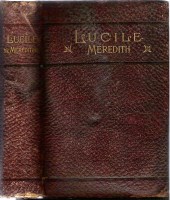
[Tree Calf (faux)]. None of the editions described in PTLA are offered in tree calf, so this copy, very likely in a binding roughly contemporary with its printing, may not have been issued by Belford & Clarke. It is of interest, however, as the tree calf panels are in fact printed sheets. Note the front and rear boards are identical, a result impossible to achieve with the boards are individually decorated. In this case, even the border "rolled in gold" has been printed; and in fact the roll pattern at top, bottom and foreedge has been continued on the sheet so it decorates both the edges and the turn-ins -- an extraordinary extra effort to make!
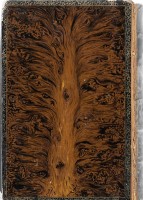
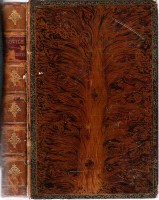
Popular Caxton 12mos.
1889 PTLA: We wish to call particular attention to the fact that this line contains a great number of fast-selling copyright books, and that, as a whole, it is the best selling one now on the market. 150 volumes, 12mo, cloth, each 50 cents.
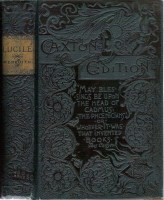
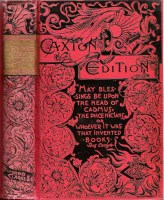
Last revised: 29 September 2024